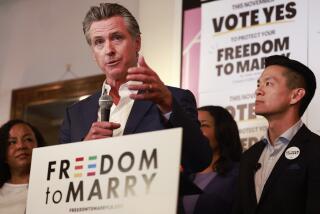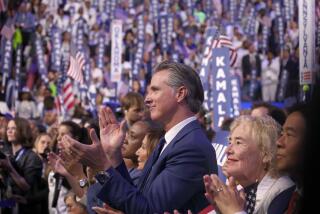Won’t Run as Favorite Son in 1988 Race, Governor Says
SACRAMENTO — Ending weeks of speculation, Gov. George Deukmejian announced Wednesday he has decided against running as a favorite-son presidential candidate next year, declaring that Californians should not waste their votes on somebody who is not seriously seeking to lead the nation.
Deukmejian also firmly disavowed any vice presidential aspirations, saying flatly: “That I’ve ruled out. I will not be on the ticket in 1988. There’s no question.”
But the governor disclosed he soon will create a citizens’ group that he conceded--with a wide grin--could turn into a political steering committee for a 1990 reelection effort, or even a 1992 presidential bid. “I’m not ruling out anything at this point,” he told an hourlong press conference.
Two Immediate Purposes
Deukmejian said there are two immediate purposes for the committee, about which he offered virtually no details: to build grass-roots support for his policies, and to advise him on “a broad range of state, national and international issues” as they relate to California
But it was clear from interviews with Deukmejian confidants that there are two other, more long-term purposes for the committee: to provide a fund-raising mechanism that can help the governor become a national political force during his second term, a role he steadfastly avoided during his first four years in office and to assure that he keeps wide open his political options beyond 1988.
Some intimates now think there is a strong likelihood that Deukmejian will seek a third term in 1990, something no California governor has been able to win since Earl Warren managed it in 1950. Deukmejian then potentially could be in a strong position to seek the presidency two years later, at age 64, especially if a Democrat should win the White House in 1988.
“I want to have available all possible options for my future in public life,” the governor told reporters. “Those options obviously include the possibility of running for a third term. (And) those options would include, perhaps, some other role in public office.”
Deukmejian’s decision not to become a favorite-son presidential candidate followed several weeks of deliberation, during which he was strongly advised by many national politicians and some of his own strategists to forget the idea. “He ran it up the flagpole and it came down looking like a flag from Ft. McHenry,” commented former Deukmejian adviser Doug Watts, now a Washington-based political consultant.
The favorite son idea was generated by some Republican legislators and state party leaders, who theorized it could keep peace within the California GOP by heading off a bitter primary, save millions of dollars in contributors’ money and give Deukmejian clout at the national nominating convention because he would be leading the largest delegation. The governor presumably would be courted by serious candidates at the convention and turn over California’s delegates to one of them.
Theory Broke Down
Privately, many advocates of a favorite-son candidacy--particularly legislators--relished the thought of being insulated from having to choose up sides among any of the serious contenders early in the campaign.
But the theory broke down when three major candidates--Vice President George Bush, Sen. Robert Dole of Kansas and Rep. Jack Kemp of New York--let it be known that they would run in the California primary, no matter what Deukmejian did. Thus, the governor could not be assured of victory, let alone a peaceful, low-cost primary.
Beyond that, Deukmejian told reporters: “I just don’t feel comfortable about asking somebody to vote for me for the Republican nomination for President when I’m not in fact a candidate.” He said California Republicans “deserve to have the opportunity to participate fully and completely in the primary on behalf of the men or women who are bona fide candidates for President.”
Some Deukmejian advisers, who did not want to be identified, seemed to breathe a sigh of relief after the governor’s announcement. But they emphasized that the governor’s decision should not be interpreted as a signal that he is “dropping out” politically. To the contrary, they said, his announcement of the new citizens’ group was designed to send a message that he intends to be “a player” nationally.
Patterned After Reagan’s Group
The concept obviously was patterned after Ronald Reagan’s old “Citizens for the Republic,” a private group which provided the fund-raising machinery and issues research leading up to the former California governor’s 1980 presidential campaign.
Deukmejian’s group also likely will become an official Political Action Committee, authorized to raise money for various political activities, nationally and in California.
But the governor provided no details Wednesday, either about the membership of the committee, its size or even its name. He said that would come “soon.” Aides said it probably would not be for several weeks.
It was learned, however, that the committee will have its own office and staff and be heavily influenced by four veteran Deukmejian political advisers: Gubernatorial Chief of Staff Steven A. Merksamer; Ken Khachigian, a private consultant and speech writer; Los Angeles attorney Karl M. Samuelian, the governor’s principal fund-raiser, and Pat Formby, of Long Beach, his longtime campaign treasurer.
All the national political ramifications aside, Deukmejian aides reported, the governor for some time has felt an urgent need to build the type of grass-roots citizens’ organization that candidates used to develop during statewide election races, but have become almost archaic during the modern era of high-tech campaigns with heavy emphasis on television commercials and computerized mailings.
‘Strengthened Network’
“One of the purposes,” Deukmejian said, “is to gain additional support within the state on behalf of the programs and the policies we’re advocating. We need to have a strengthened network.”
Additionally, the governor and his advisers said, the committee will enable Deukmejian to reach outside his Administration to draw on the expertise of people experienced in international and national affairs. “We’ve got to become more involved and more familiar with national and international issues,” Deukmejian said, “and I would expect to speak out on those issues--particularly as they affect California’s future.”
“At the same time,” the governor continued, “I think that there’s a more significant role that we can play in terms of the national (Republican) ticket and national policies.”
He said he may endorse a candidate for the Republican presidential nomination, and most insiders would expect that person to be Vice President George Bush. But, the governor also added, “I might just stay out of it.”
More to Read
Get the L.A. Times Politics newsletter
Deeply reported insights into legislation, politics and policy from Sacramento, Washington and beyond. In your inbox three times per week.
You may occasionally receive promotional content from the Los Angeles Times.











